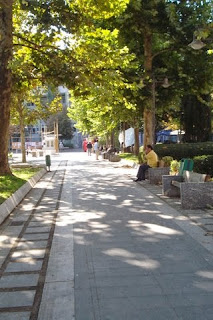Town Square
I arrived by train from Athens in the afternoon. Chryssa had booked me into the Metropol Hotel right in the downtown area close to the town center venue where the conference was held. The hotel is on a street that opens onto the city square, a lovely park with shade trees surrounded by outdoor tavernas.
Frappe
I strolled around the square, noting some of the curious sculptures, many of them sprayed with graffiti, a couple constructed of pieces of ancient columns. A group of children were having fun clambering over them.
Larissa (population about 200,000) is the capital city of Thessaly, located in an agricultural area surrounded by lush farmlands and imposing mountains. The area is fertile and produces cotton, grains, watermelon, tobacco, vegetables and vineyards. The city has an interesting history. According to myth, this is where the Greek hero Peleus lived with his legendary son, Achilles. The city was named after a nymph, Larissa. The name means "fortress". Larissa is thought to be where the famous Greek physician Hippocrates died. On the outskirts of the city there is a monument to the father of medicine where the tomb was discovered in 1826. Larissa was one of the chief cities of ancient Thessaly, once ruled by the Thebans until it was annexed by Philip II of Macedonia in 344 BC and came under the Macedonian control. It was known in antiquity for its horses and the Thessalian horsemen became an important part of Philip's cavalry.
In 196 BC Larissa became an ally of Rome and was headquarters of the Thessalian League. during the 1400s, it was under Ottoman control and became a predominantly Muslim city. It remained in Ottoman hands until 1881.
That evening the conference was held in the Town Centre. I was warmly welcomed by Chryssa and the other members of the World Poetry who attended. It was an evening of poetry and music which was very enjoyable, though most of it was in Greek. I was given time to speak about my novel (translated by Chryssa). After the program some of us went to a nearby taverna to try some traditional Thessalian cuisine , mezodopoleia (little plates of food) including delicious meat dishes, cheeses and wine.
Young Musicians.
Chryssa Velissariou
The next morning I went on a walk through the commercial centre to explore some of the city and came across an ancient theatre. On the slope behind the theatre, Larissa's acropolis hill is the church of Ayios Ahillios (Saint Achilles, the city's patron saint) there was once a fortress but today only the 15th century Turkish market survives. If I'd had time, I would have gone for a walk to Alkazar Park that stretches along the Pinios River.
Ancient Theatre
Street Scenes















No comments:
Post a Comment